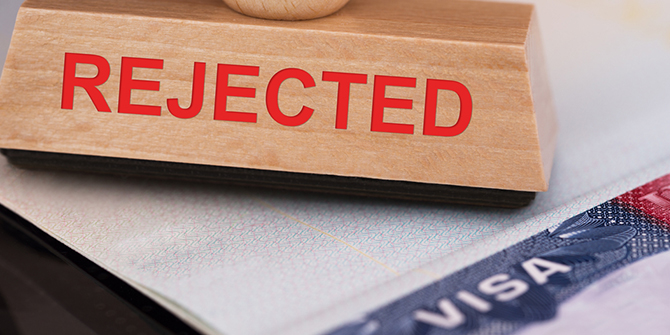LSE researcher McDonald Lewanika analyses the evolving situation in Zimbabwe.
It is almost certain that a coup d’état has been staged in Zimbabwe, although the army denies it. However, we should be debating what type of coup d’état this is.
While this military takeover has the hallmarks of a ‘guardian coup’¹ – the military announcement about dealing with corrupt elements around President Mugabe, restrictions issued to various sectors in the community and limited bloodletting – there are also indications that it could be a ‘veto coup’².
This is clearly seen from the factional stance that the Commander of the Defense Forces, General Constantine Chiwenga, took, which demonstrated that this intervention is not altruistic, but rather a clever, yet dangerous manoeuvre to shore up his precarious position. Following the sacking of the Vice President Emmerson Mnangagwa, General Chiwenga stated in a press conference on Monday 13 November that “the military will not hesitate to step in” if the instability in Zanu-PF continued. This statement highlighted the military’s break with Mugabe and the ruling party. While this statement also called for the end to purges, it has now instituted a purge of its own aimed at the G40 faction whose members I now understand are either arrested or on the run.

The military has always had an involvement in ZANU-PF affairs, although this has often been covert and deniable, particularly when in service to Robert Mugabe. This time, however, it is overt and undeniable and ostensibly in defence of democracy in ZANU-PF. This is in direct opposition to party line, which has been purging pretenders to Mugabe’s throne who coincidentally have also been veterans of the liberation struggle.
General Chiwenga’s statement and subsequent takeover marks a break with tradition and creates chaos and uncertainty, which did not previously exist (outside the higher ranks of the military). Instead, the leader of the army is using the might of the military to serve narrow factional (and personal) interests, which ultimately subvert the very democracy for which he was arguing in favour.
As such it is very clear that things have changed in Zimbabwe. However, it will take some time before we can perceive whether this takeover proves to be a guardian or veto coup. Whatever the case, it is likely that President Mugabe will be asked to step down and Parliament will be allowed to institute a constitutional change of leadership, which in Zimbabwe’s case means the ruling party would have to nominate another individual. In this case, the ZANU-PF extraordinary congress scheduled for December will be allowed to go ahead with the party “allowed” to make the appointment of Mnangagwa legal. This could possibly result in the former Vice President opting for a zero-sum transition, where the “winners” take all the spoils, and rewarding the generals through appointing the Commander of the Defense Forces as his deputy.
Another permutation would be to institute an inclusive transitional government with the opposition. But it is unlikely that the military will opt for a civillian transitional authority which they are not part of or control.
The new authorities also have the possibility of briefly retaining Mugabe as a figurehead, who retains Mnangagwa, who effectively takes over and becomes de facto leader, with Mugabe being allowed a “ honourable” exit in December at the ZANU-PF congress. Should Mugabe refuse to resign or be titular, the military will still need some civilian authorities to action their plans to minimize outrage and remove the scent of a military coup. They are likely to turn either to Vice President Phelekezela Mphoko of Speaker of Parliament Jacob Mudenda to usher in the new dispensation.
In any event, the electoral calendar will change to accommodate either an early election to quickly legitimize the changes under way, or delayed elections under the guise of instituting electoral and democratic reforms, maintaining stability. This pause will also allow the establishment to make the requisite constitutional arrangements to accommodate any new order, if such an order deviates from constitutional norms.
The coup d’état is Zimbabwe is real, and it is vital that those concerned ensure that it does not become a permanent or long-lasting feature in the polity; and to manage it towards a democratic resolution that sees the army back in the barracks.
This article is based on an interview with Heinrich Boll Stiftung – Southern Africa.
¹A guardian coup d’etat is one where the military steps in to deal with poor or bad governance.
²A veto coup is one calculated to pre-empt imminent threats to the interests of the military establishment
McDonald Lewanika (@makil) is a doctoral student at LSE, researching competitive authoritarian regimes, the African state electoral campaigns and a politics and development professional and researcher with over 15 years progressive experience working in Zimbabwe, the Southern Africa region and some parts of Europe.
The views expressed in this post are those of the author and in no way reflect those of the Africa at LSE blog or the London School of Economics and Political Science.






5 Comments